|
|
|
Sort Order |
|
|
|
Items / Page
|
|
|
|
|
|
|
| Srl | Item |
| 1 |
ID:
130826
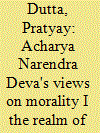

|
|
|
|
|
| Publication |
2014.
|
| Summary/Abstract |
Acharya Narendra Deva strongly believed that the Gandhian ideas based on morality and ethics could be the only solution to meet the basic needs of a society both developing and developed. It was thus that even after independence, he wielded the Gandhian weapon of Satyagraha most effectively to ?ght every form of injustice against the oppressed and the depressed in the then Indian society. Like Gandhi, he gave the highest priority for the removal of rural backwardness and he was in favour an innovative technology that could help in bringing an all round development in a developing society. He was a profound thinker who could analysis political, economic and social problems in their totality and his socio~political ideas about the solution to the problems facing the nation and society was exclusively original in its entirety. Narendra Deva accepted the value of morality and ethics of Gandhi and practised it fully throughout his whole life. It was Gandhi, who ?rst demonstrated the powerful effect on his countrymen of renouncing wealth for the sake of human service rather than personal salvation and Deva had trodden the same pathway into lndia's heart. Gandhi and Narendra Deva acquired their moral strength through renunciation, much as lndia's ancient sageswere supposed to obtain magical powers through their austerities. Their magic was singleness of purpose and an iron will. When Deva joined the Indian political
struggle under Gandhian leadership, the Mahatma once told him to simplify life and he took his words to heart. They never urged anyone else to follow their way of life and went their own way with a striking serenity. As a leading intellectual of outstanding mould, Acharya Narendra Deva had a forceful urge to bring about social justice, processed through a strong vein of idealism and always expressed deep concern for the down- trodden lndian masses. He remained a path?nder of the socialist movement in India and strongly believed that freedom was the first postulate for the establishment of the socialist society in India. He felt that without political independence the socialist programme could never become a reality. Narendra Deva always emphasized the moral and cultural elements of Marxism, but in the Indian socio-political context, he said that the class con?ict was already in existence and the real question was on whose side you were going to stand. Moreover, it was wrong to assume that the capitalist class had no vested interest in the freedom struggle. He, therefore, viewed that the socialists should create consciousness among labour, convince them that their interest would be well protected inn the freedom struggle and should broaden the base of that struggle by organizing the toilers. That is why; Gandhi and Deva wanted the historical stream of the cultural progress of India, in order to sustain the flow of continuity. In fact, Gandhi and Narendra Deva's entire socio-political ideas were ofa new social order purely based on universal love, ahimsa, morality and most importantly the role of ethics in Indian politics. Gandhi's ideal society was a non-violent and stateless society and repudiated state on ethical, historical and economic grounds. Unlike Marx, Gandhi and Deva persistently put emphasis on moral force and on the - realization of one's own self and there was no place for violence in their whole socio-political philosophy. The purpose ofthe article is to highlight the impact of ethics and morality on Narendra Deva's socio-political ideas and its relevance in the 21" century.
|
|
|
|
|
|
|
|
|
|
|
|
|
|
|
|
| 2 |
ID:
118140
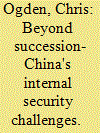

|
|
|
|
|
| Publication |
2013.
|
| Summary/Abstract |
China is undergoing a transitional period of rapid economic and social development. The way in which this period is managed will hold significant implications for the Chinese state concerning both its internal and external security. While fundamentally resting upon progressing from a developing to a developed economy, this transition highlights deep issues and tensions affecting China-ranging from rising societal inequalities to various separatism threats to mounting individualism. Regardless of internal succession struggles within the Communist Party of China (CCP), it is critical to focus upon this multitude of (mounting) social and economic issues-particularly outside of the political realm-that China's new leaders will have to face. Here, we highlight three themes central to this transition-a search for internal stability; China's multiple, interlocking internal issues; and the longevity, resilience and adaptability of the CCP-in order to assess their potential impact on China's domestic and, critically, external politics.
|
|
|
|
|
|
|
|
|
|
|
|
|
|
|
|
| 3 |
ID:
130792
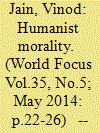

|
|
|
|
|
| Publication |
2014.
|
| Summary/Abstract |
Earlier the world as a whole was a conflict -zone. People living in a particular region had norms and morality which served them well. But that morality was at the cost of people living in other regions because of conflicts between them. So, that morality involved inhumanity towards those living outside their regions. Now due to growth of science, industry and technology, the world seems to be coming closer to all; the unfamiliarity that prevailed earlier between people of different regions is diminishing and familiarity is growing. People around the globe are becoming aware of this. innumerable institutions that are taking shape are spreading the awareness about the inadequacy of old thinking, ideas and morals. Take Europe for instance. Different regions or countries of Europe were indulging in prolonged wars with each other. This, after the Second World War, changed. They realized the futility of it all, and established various institutions like the European Union. Thus reducing and extinguishing the con?icts between them, leading thereby not only to a prolonged period of peace but to unheard of prosperity.
|
|
|
|
|
|
|
|
|
|
|
|
|
|
|
|
| 4 |
ID:
130827
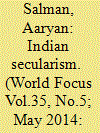

|
|
|
|
|
| Publication |
2014.
|
| Summary/Abstract |
"I believe in a religion based on universal and all-embracing principles which have always been accepted as true by mankind - the primeval eternal an religion, which means that it is above the hostility of all human an creels whatsoever. " - -Swami Dayananda Saraswati. There can be little debate on the In?uence of co Religion on Human History. The overwhelming impact of Christianity, Hinduism, Zoroastrianism, Judaism, or Islam on Civilization is seen not only in the cultural pl: semblance and value system which emerge from their - D2 teachings, but also re?ects in the effects they've had Ul on mankind. un an Believers and Unbelievers alike have acknowledged the profound in?uence of religion on ha individuals, societies and on humanity's collective life. the Religion was and is a power that's here to stay with above both the western and eastern hemispheres! that will On the other hand, Religion was and is still the considered a pariah' by Western Secularism! According are to historian R. Scott Appleby "Religion, at last, can no be longer be ignored". This was one of ?ve "unintended, unforeseen" consequences of 9/ l 1. HI In present day, challenges are manifold both co at domestic and at international level. Most political of con?icts end up passing through the prism of religion» pr. or ethnicity and are claimed to be the trigger factor in cl: many con?icts. The relationship between Religion and special Con?ict is complex.3'And Religion is at the heart of the Secularism Debate as Ethnicity and Religion have been an the building blocks of an lndividua1's Identity. Appleby hi: de?ned religion as 'the human response to a reality m: perceived as sacred
|
|
|
|
|
|
|
|
|
|
|
|
|
|
|
|
| 5 |
ID:
146830
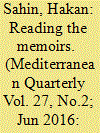

|
|
|
|
|
| Summary/Abstract |
The military’s attitude toward the political realm is problematic in Turkey. While, on the one hand, it accepts the notion of civilian control, on the other hand, it has sometimes exercised tutelary functions or overtly intervened in politics. This essay argues that political thoughts of soldiers have an explanatory power in understanding this dilemma. It examines a set of more than 150 life narratives written by soldiers. Memoirs, autobiographies, and journals are relatively convenient means through which to explain one’s personal thoughts. An elaboration on those texts suggests that soldiers have an ambivalent perception of the political realm, and this serves as a basis for the legitimization of their political actions. The implicit idea that they are the ultimate guardians of the country is embedded in the fact that they are respectful of democracy and are in favor of civilian control in their discourses.
|
|
|
|
|
|
|
|
|
|
|
|
|
|
|
|
| 6 |
ID:
115623
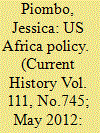

|
|
|
| 7 |
ID:
124494
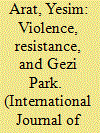

|
|
|
|
|
| Publication |
2013.
|
| Summary/Abstract |
As a student of politics whose primary research interest is in women's political participation in Turkey, my engagement with the study of violence is through the lens of gender.1 In gender studies, "violence" is arguably the most important critical concept for the articulation of the personal as the political. Women's recognition that violence in their personal lives and intimate relationships needed to be problematized in the political realm and transformed through public debate was a revolutionary development. Bringing this recognition into the canon of political thought has been a major contribution of feminist theorists.
|
|
|
|
|
|
|
|
|
|
|
|
|
|
|
|
|
|
|
|
|